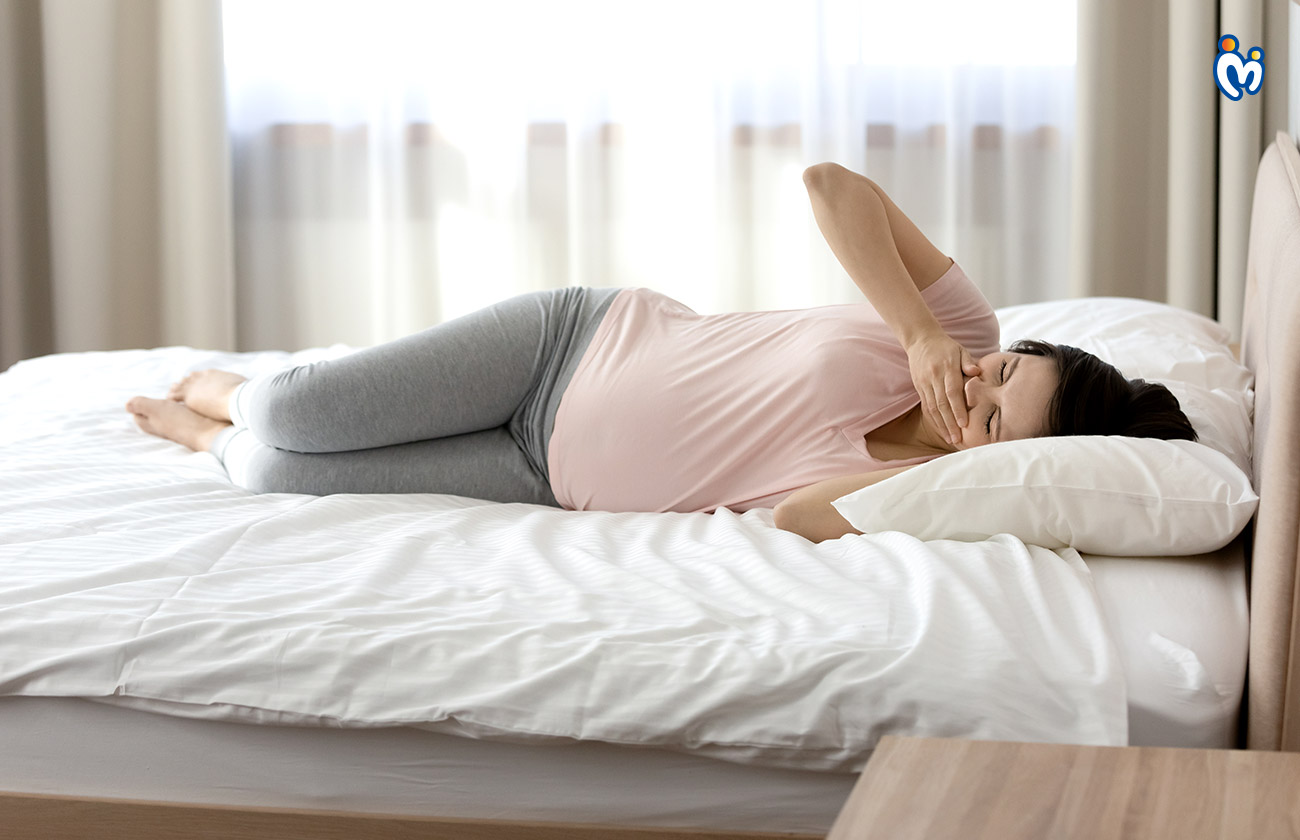Pregnancy is like going on a big adventure, where your body takes you through changes. Amidst the excitement of growing a tiny human inside you, there's one not-so-fun companion that often tags along with sleep struggles!
You might expect sleepless nights to begin only after your baby arrives, but they can start much earlier. Yes, those elusive Zzz's can sometimes play hide-and-seek with you during pregnancy too.
Understanding Pregnancy Sleep Struggles
Pregnancy-related sleep disturbances can stem from various physical and emotional changes. Knowing what's behind these sleep hiccups can make it easier for you to tackle them. Here are some common sleep challenges that expecting moms usually face:
- Physical Discomfort: As your belly grows, getting comfy in bed can feel like a game of Twister. Back pain, pelvic discomfort, and leg cramps often join the party, making restful sleep a challenge.
- Frequent Urination: Your bladder seems to have turned into a frequent flyer, especially in the third trimester. Those nighttime bathroom trips can seriously interrupt your beauty sleep.
- Hormonal Changes: Blame it on the hormones! Progesterone might make you feel like a nap queen during the day, but come night, it can leave you tossing and turning.
- Heartburn and Indigestion: Lying down with a fiery belly? Heartburn and indigestion can be the uninvited guests at your bedtime. They often make it tough to drift off and stay asleep.
- Anxiety and Stress: Pregnancy's emotional rollercoaster—worrying about the baby, labor, and parenthood—can bring insomnia along for the ride, keeping you wide-eyed at night.
- Restless Leg Syndrome (RLS): If your legs have a mind of their own, welcome to the world of RLS. That urge to move and those weird sensations can keep you from catching those precious Zzz's.
Many specialists suggest that pregnant women who experience sleep deprivation are at a higher risk of complications. Finding ways to improve sleep and overall health during pregnancy isn't just crucial for your energy levels and mood—but for your overall health too. Here’s a guide to navigating those pregnancy sleep struggles and reclaiming your right to a restful night.

Tips for a Restful Night
While some sleep disturbances are inevitable, there are several strategies you can employ to improve the quality of your sleep during pregnancy. Here are some tricks to help you catch those Zzz’s during pregnancy:
The Pillow Fort Strategy
First things first: grab lots of pillows—big ones, small ones, fluffy ones—and strategically arrange them around you. This isn't just about feeling comfy—it's about making a cozy nest where you can find a nice spot to rest. You might want to try a special pregnancy pillow that wraps around you like a big hug.

Managing Sleep Disorders
During pregnancy, sleep disorders can unexpectedly arise or intensify. Issues like restless leg syndrome might surprise you by worsening or starting afresh with each pregnancy. And watch out for sleep apnea—it's not just a snooze issue but can also affect mom and baby, linked to tricky things like gestational diabetes and pre-eclampsia. Tackling these snooze snags early on can help sail through pregnancy!
Dance with Gravity
Raising your upper body a bit with pillows can really help, especially if heartburn bothers you at night. It's like saying to gravity "Hey, I'm the boss here!"
Battle of the Bladder
Those midnight bathroom trips are common during pregnancy. To reduce these trips, try cutting down on liquids before bedtime. It's a delicate balance between staying hydrated and avoiding those pesky 3 AM wake-up calls from your bladder.
Snack Attack
Let's talk about snacks. Not just any snacks, mind you—ones that won't induce a midnight sugar rush or send you on a heartburn rollercoaster. Crackers, a bit of cheese, or a calming cup of chamomile tea can be good choices. Your body and your baby will thank you for the tasty treats.
Embrace the Naps
During pregnancy, naps aren't just a luxury; they're a survival skill. Take advantage of any chance to rest during the day. Your body's working overtime, so a little extra shut-eye during the day can make a world of difference.
Create a Bedtime Routine
Create your own bedtime ritual. It could be a warm bath with soothing lavender oils, a few pages of a good book (bonus points if it's about parenting hacks), or some gentle stretching to ease those pregnancy muscles. Find what helps you unwind best!
The Great Temperature Debate
Your body temperature might fluctuate during pregnancy. Experiment with different bedding options—light sheets, cozy blankets—and find what keeps you comfortably snug without overheating.
Mineral Boost
Ensure you’re getting enough calcium and magnesium in your diet. These minerals support your baby’s growth and may help prevent leg cramps.
Avoid Sleeping Pills
Avoid over-the-counter sleep aids and herbal remedies, as they're generally not recommended for pregnant women. Consult your healthcare provider for other options if sleep disruptions persist.
Mind Over Matter
Last but not least, remember that you're growing a tiny miracle inside you. It's okay to have sleepless nights and moments of frustration. Take a deep breath, practice some relaxation techniques, and remind yourself that this journey is temporary but so-worth it.
Conclusion: Dream Big, Sleep Well
- So there you have it—your playful guide to conquering pregnancy sleep struggles like the warrior mom-to-be you are. Build your pillow fort, dance with gravity, and embrace every moment of this incredible journey. With a little creativity and a lot of pillows, you'll be dreaming big and sleeping soundly in no time.
Now, go ahead and conquer those Zzz's, because you've got this, momma! And remember, the best sleep of all might just be yet to come—once your little bundle of joy decides to join the party.
Happy sleeping, moms!
FAQ's
Q. Why do I have trouble sleeping during pregnancy?
Ans.Pregnancy affects sleep due to hormonal changes, physical discomfort, and emotional stress. As your body grows and changes, it becomes harder to find a comfortable position, while factors like heartburn and frequent urination add to the challenge. Understanding these causes helps manage and improve sleep quality during pregnancy.
Q. What is the best sleeping position during pregnancy?
Ans.Sleeping on your left side is often recommended during pregnancy. It improves blood flow to the placenta and helps your kidneys eliminate waste efficiently. Use pillows between your knees and under your belly for support. Avoid sleeping flat on your back in later trimesters as it may reduce circulation.
Q. How can I deal with frequent urination at night?
Ans.To minimize nighttime bathroom visits, reduce fluid intake 1–2 hours before bedtime. Ensure you stay hydrated throughout the day to avoid dehydration. Empty your bladder completely before going to sleep and avoid caffeine, which can irritate the bladder and increase the urge to urinate.
Q. Are pregnancy pillows really helpful for sleep?
Ans.Yes, pregnancy pillows offer full-body support and reduce pressure on the hips, back, and belly. They help align your spine and support side-sleeping positions, promoting comfort. Whether it’s a C-shaped, U-shaped, or wedge pillow, finding the right one can significantly improve your nighttime rest.
Q. Can I take sleep aids during pregnancy?
Ans.Avoid using over-the-counter sleep medications or herbal remedies without medical approval. Many aren't safe during pregnancy and may affect your baby. Instead, focus on natural strategies like relaxation techniques, warm baths, or guided meditation. If insomnia is severe, consult your doctor for safe alternatives.
Q. What can I do to prevent leg cramps while sleeping?
Ans.Leg cramps are common in pregnancy due to mineral imbalances and circulation changes. Ensure you’re getting enough calcium and magnesium. Stretch your legs before bed and stay active during the day. Gentle prenatal yoga and massages can also help reduce cramp frequency and discomfort.
Q. How does anxiety affect pregnancy sleep?
Ans.Anxiety and stress can make it harder to fall or stay asleep. Worrying about labor, baby care, or body changes often leads to racing thoughts at night. Try calming bedtime routines like journaling, deep breathing, or listening to soft music to relax your mind and body.
Q. Is it safe to nap during pregnancy?
Ans.Absolutely! Naps help combat pregnancy fatigue and improve mood and energy levels. Keep naps short—around 20–30 minutes—and avoid napping too late in the day to prevent nighttime sleep disruptions. Listening to your body and resting when needed is vital for you and your growing baby.
Q. What foods or drinks help promote sleep during pregnancy?
Ans.Light, protein-rich snacks like cheese, crackers, or a banana can prevent nighttime hunger. Warm milk or chamomile tea (if approved by your doctor) may help you relax. Avoid spicy, sugary, or acidic foods at night to reduce heartburn and improve your chances of restful sleep.
Q. When should I seek medical help for sleep issues in pregnancy?
Ans.If you’re consistently unable to sleep, experience severe insomnia, snoring with pauses in breathing (possible sleep apnea), or feel excessively fatigued, consult your healthcare provider. Sleep issues can sometimes signal underlying health concerns that need medical attention to ensure the well-being of both mother and baby.




















